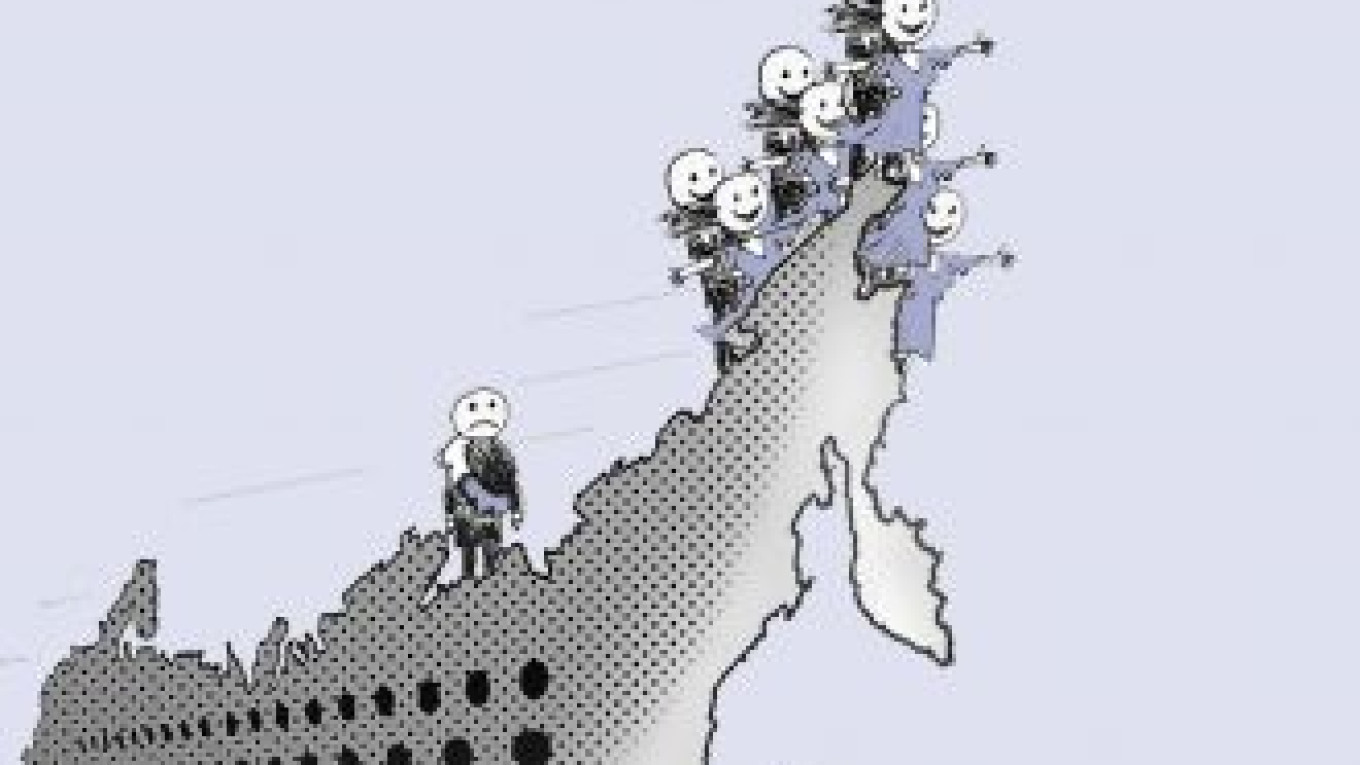Strategy 2020 — the question of where Russia will be in 2020 — hangs in the air. There are a variety of scenarios being offered by leading economists, political scientists and other analysts, but one thing is clear: There will be no miracles in the next nine years. The prospects for a country mired in archaic institutions, an oil- and gas-dependent economy, systemic corruption, unprotected property rights, corrupt courts, fraudulent elections and an apathetic population can only be dim at best.
I’m almost certain that Russia will not be able to survive in its current borders through 2020. This is not an exaggerated, sensational prognosis taken from the blogs of radical liberals or anarchists, but a clear-headed, objective analysis based on the Kremlin’s flawed policies over the past decade.
This prediction is not intended to fan the flames of separatism, extremism or crazy Zionist conspiracy theories. Rather, this is the umpteenth attempt to sound the alarm and draw public attention to the severity of Russia’s problems. In this way, we can help prevent the country from collapsing.
Today, Prime Minister Vladimir Putin is held hostage by a political dead end that he himself created, very similar to the trap former Soviet leader Leonid Brezhnev set for himself and the country. Even if we assume for a second that Putin wanted to radically modernize and liberalize his? system — or even retire if he so desired — he would not be allowed to do so by the elite who surround him. This is the elite who believe that the government is their personal property. After betraying his role as the guarantor of the Constitution, Putin has effectively become a guarantor of corruption — guaranteeing the financial well-being of millions of bureaucrats, government employees and well-connected businesspeople.
Keeping Putin’s political and business elite in power until 2020 could become one of the main reasons for the country’s collapse. A corrupt bureaucracy, by definition, is incapable of instituting economic and political reforms.
And what about society? Most Russian adults do not vote, largely because they have lost faith in any hope that post-Soviet elections can be pluralistic, free and fair. The one factor that has kept middle-class Russians distracted from politics is their high level of consumption. As long as they have money to spend, they will have much more interest in consumer goods than who is sitting in the State Duma, local legislatures, Kremlin or White House — or their policies. But as soon as this relative prosperity drops, civil protest will surely awaken.
Any student of economics can name a dozen factors that carry a risk of economic collapse. Among them are the high dependence on natural resources; low productivity; an ineffective, corrupt, bloated and overly centralized state apparatus; dependent courts; technological backwardness; and an unattractive investment climate. These factors, among others, generate a vicious cycle of poverty and excludes the implementation of a long-term development strategy for the country. It also guarantees a flight of capital, as well as Russia’s most talented and innovative people to freer and more open societies.
The key factor that will determine Russia’s collapse will be the price of oil. Five years ago, a balanced budget required only $30 per barrel of oil. This year, it has jumped to $115 because of higher government spending, waste and corruption. Next year, the figure will increase even further to $125 per barrel. If the price of oil drops to $90 a barrel, this will be the beginning of a serious economic crisis for Russia. The stabilization fund might be able to hold the budget over for a couple of years, but inevitably the state will have to cut back on social programs. These cuts in social spending will only exacerbate public discontent. It may also provoke self-sufficient regions to rethink their loyalty to Moscow.
Unfortunately, only a severe crisis can produce the shock needed to spark change in Russia. We, as concerned and law-abiding citizens, must develop peaceful alternatives to existing? policies and wait for the right moment when the politically impossible becomes the? politically inevitable.
Sergei Petrov is a State Duma deputy from the Just Russia party and founder of Rolf Group. This comment appeared in Vedomosti.
A Message from The Moscow Times:
Dear readers,
We are facing unprecedented challenges. Russia's Prosecutor General's Office has designated The Moscow Times as an "undesirable" organization, criminalizing our work and putting our staff at risk of prosecution. This follows our earlier unjust labeling as a "foreign agent."
These actions are direct attempts to silence independent journalism in Russia. The authorities claim our work "discredits the decisions of the Russian leadership." We see things differently: we strive to provide accurate, unbiased reporting on Russia.
We, the journalists of The Moscow Times, refuse to be silenced. But to continue our work, we need your help.
Your support, no matter how small, makes a world of difference. If you can, please support us monthly starting from just $2. It's quick to set up, and every contribution makes a significant impact.
By supporting The Moscow Times, you're defending open, independent journalism in the face of repression. Thank you for standing with us.
Remind me later.


